Picture
Your Present Location: HOME> PictureThe “Seeking Peace and Promoting Development: An Online Dialogue of Global Think Tanks of 20 Countries” was successfully held on May 6, 2022
Source: RDCY Published: 2022-05-10
On May 6, 2022, the “Seeking Peace and Promoting Development: An Online Dialogue of Global Think Tanks of 20 Countries” was successfully held. The dialogue was hosted by the China Public Diplomacy Association and Renmin University of China, organized by Chongyang Institute for Financial Studies, Renmin University of China (RDCY). More than 30 guests from 20 countries, including Brazil, Slovenia, Malaysia, Pakistan, the United Kingdom, and Canada, gathered online and offline to discuss the way of seeking world peace and the development under the “profound changes unseen in a century”. This dialogue is the largest international think tank seminar held by the Chinese think tank after the Russia-Ukraine conflict. Le Yucheng, Vice Minister of Foreign Affairs of China delivered a special speech and interacted with scholars. More than 30 media, including Xinhua News Agency, CCTV and Global Times reported the dialogue. More than 500,000 people watched the speech of Vice Foreign Minister Le Yucheng online. The event was covered by media and related public accounts in more than 20 countries, which attracted worldwide attention.
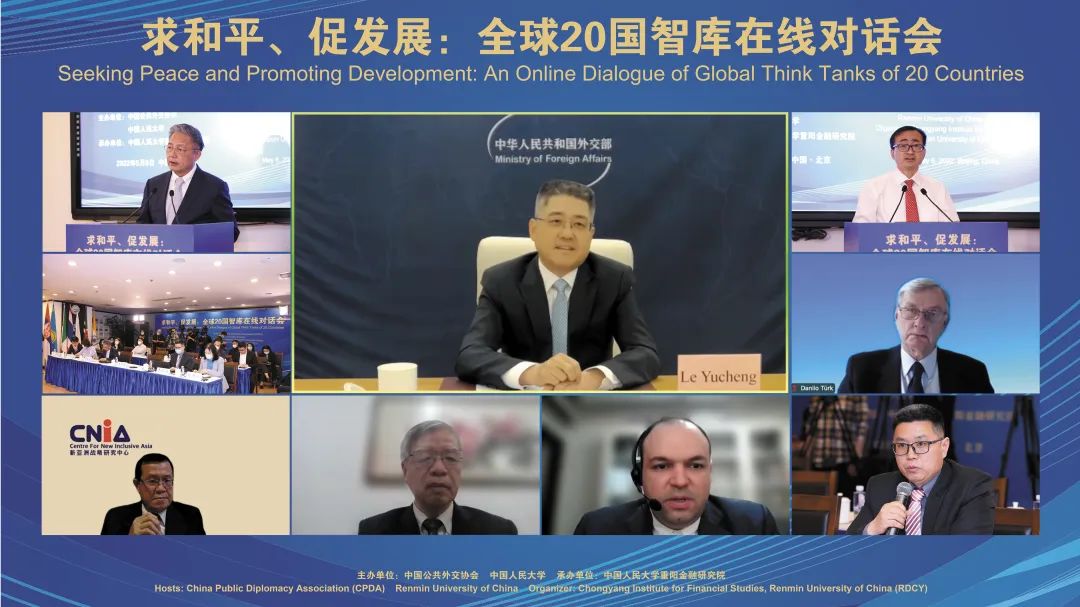
The opening session was moderated by Hu Zhengyue, Vice President of China Public Diplomacy Association.

Liu Yuanchun, Vice President of Renmin University of China, delivered an opening speech. Liu mentioned that this conference is the first large-scale international seminar held by Renmin University of China since President Xi Jinping’s visit to the campus on April 25, 2022. He stressed that human effort is the decisive factor to achieve peaceful coexistence, security and common development in the future of human history. President Xi Jinping proposed the “Global Security Initiative”(GSI) at recent Boao Forum for Asia. The initiative has received enthusiastic response and positive comments from experts, scholars and dignitaries from many countries. It reflects the common security needs of the international community under the new situation, and conforms to the common aspiration of the international community for peace, cooperation and development. In the face of many security threats in the current era, the human community must unit and all countries must adhere to the principle of multilateralism, form a rational force to maintain peace, jointly strengthen global security governance, maintain our very beautiful but fragile human civilization, and protect the common home of the world’s people.
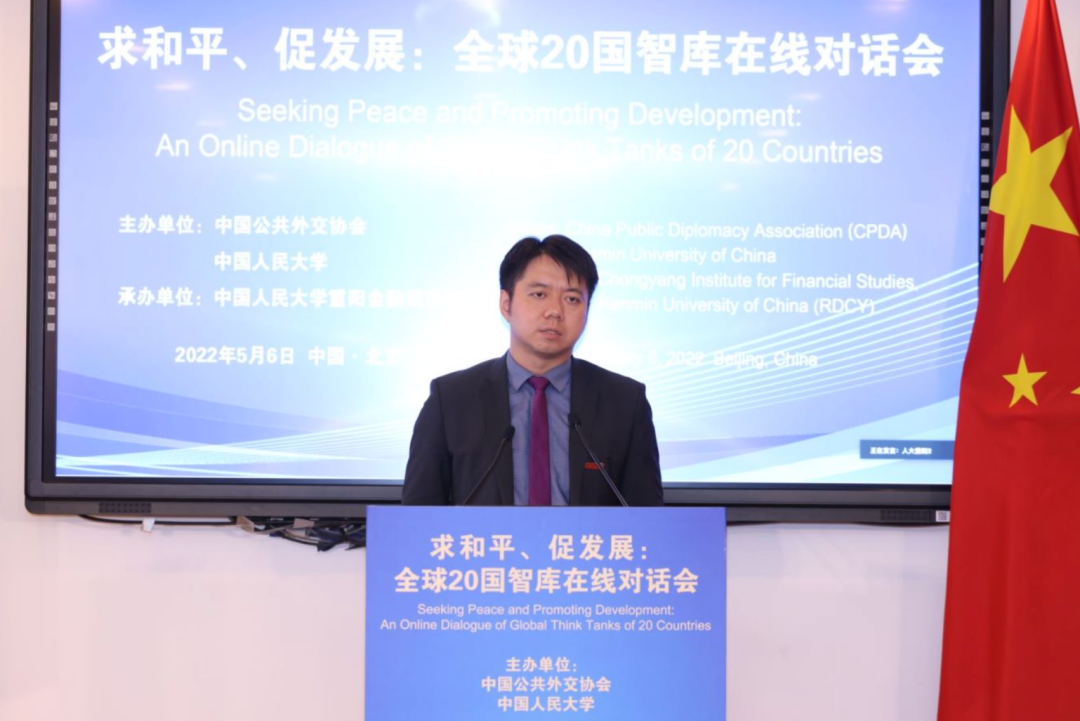
Le Yucheng, Vice Minister of Foreign Affairs of China, delivered a keynote speech. He stressed that Peace and development are the perpetual pursuit of humankind and they need to be earned and protected. Our world today faces a swirling combination of change and instability. Crises and challenges emerge without cease, and factors undermining peace are building up. Some people are even talking about the possibility of a third world war. At such a critical moment in the development of humankind, we must act with the destiny and future of humanity in mind, step up to our responsibility, and rise above prejudice and contention. Together with all peace-loving forces in the world, we must adopt the new vision on security, take active steps to operationalize the GSI, and meet the international security challenges for the sake of world peace and tranquility. He pointed out a few priorities at this moment as below. First, it is important to stay committed to international law and universally recognized norms of international relations, and reject the attempt to replace international rules with “house rules”. Second, it is important to stay committed to the principle of indivisible security, and reject the attempt to pursue one’s own security at the expense of others. Third, it is important to stay committed to global solidarity and cooperation, and reject the attempt to revive bloc politics and ideological confrontation. Fourth, it is important to stay committed to opposing unilateral sanctions, and reject the attempt to turn a regional crisis into a global one. Fifth, it is important to stay committed to security and stability in the Asia-Pacific, and reject the attempt to allow turmoil or war to arise in this region.
Session 1 was moderated by Wang Wen, Executive Dean of RDCY. During this session, the following panelists delivered the speeches:

Danilo Türk, former President of Slovenia, President of the World Leadership Alliance Club de Madrid, said that peace and security are essential conditions for development. The recent IMF analysis shows the significant blow to the global economy caused by the Russia-Ukraine conflict. Therefore, we need to make every effort to resolve and restore our peace through peaceful means. He mentioned that some commentators said the military conflict in Ukraine will strengthen the West and help re-establishing the unipolar world that characterised the immediate post – cold war period, while others favor a new era of bipolarity with the US and China as the main protagonists. However, the majority of the world’s countries have no wish to be drawn into a protracted great power competition of a proposed new bipolar world. The world needs a realistic approach to global security based on the acceptance of multipolarity.
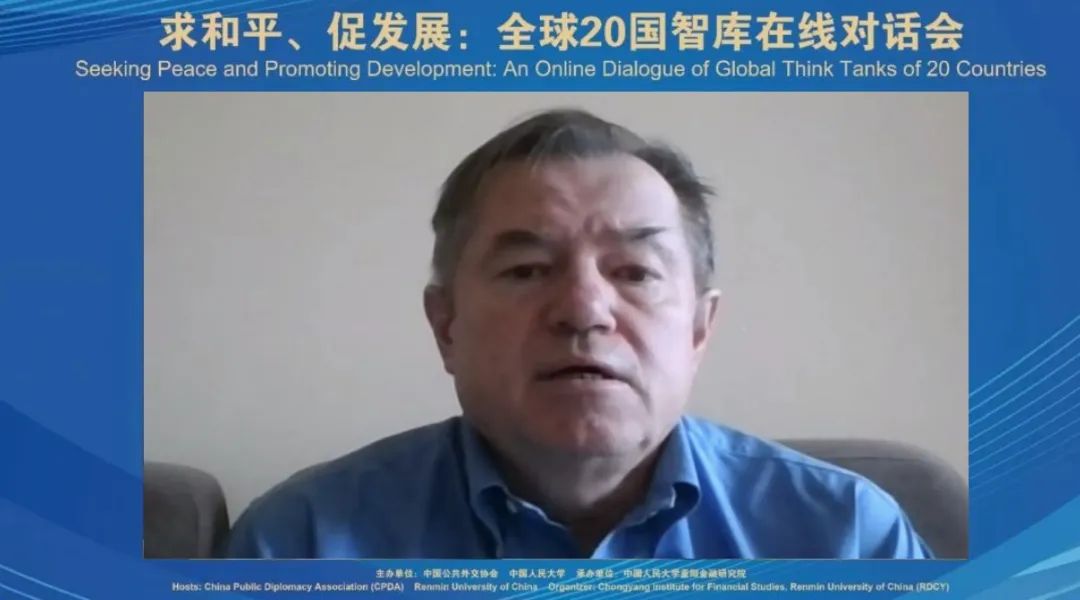
Sergey Glaziev, Eurasian Economic Commission (EEC) Minister for Integration and Macroeconomics, Academician of the Russian Academy of Sciences (RAS), said that the driving force behind the Russia-Ukraine conflict is the United States. The current war is a mixture of financial and hot warfare, and it is spilling over into the information sphere. The United States is using its influence in this field to shape the image in its will, defending and realizing its political aims through false news and public opinion manipulation. To meet this challenge, we need to build a new international monetary system based on international rules. Secondly, the United States is also using its hegemonic position in the field of information and information technology to achieve military purposes and its private interests. Therefore, it is very important to organize an international agreement on cybersecurity. Finally, further international action is needed to promote international initiatives, to stop the proliferation of biological weapons.
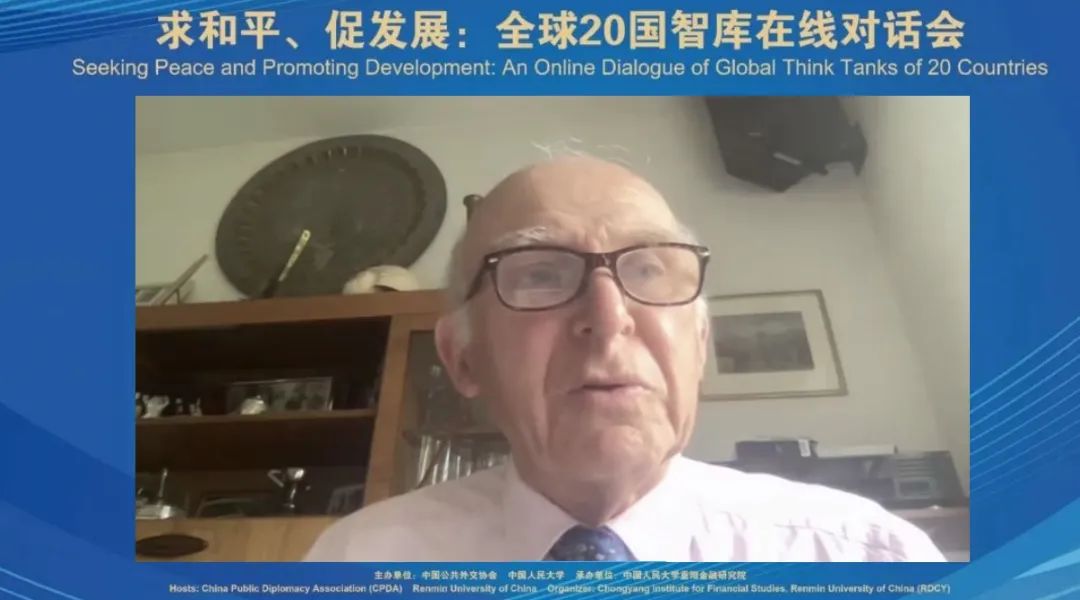
The Rt Hon Sir Vince Cable, Former Secretary of State for Business Innovation and Skills and President of the Board of Trade (2010-2015) of UK, who’s speech was focused on the economic security. He said that Western countries and China should put aside the current cold war rhetoric and actions and establish common cause. First, there is a need for an action plan to deal with emerging market and particularly low-income debt centred on Africa. Second, a key priority is to maintain and enlarge an open trading system. Third, it is necessary to carry out international cooperation in respect of key international public goods like the containment of climate change. He hoped that the world could still maintain dialogue at a time of great international tension.
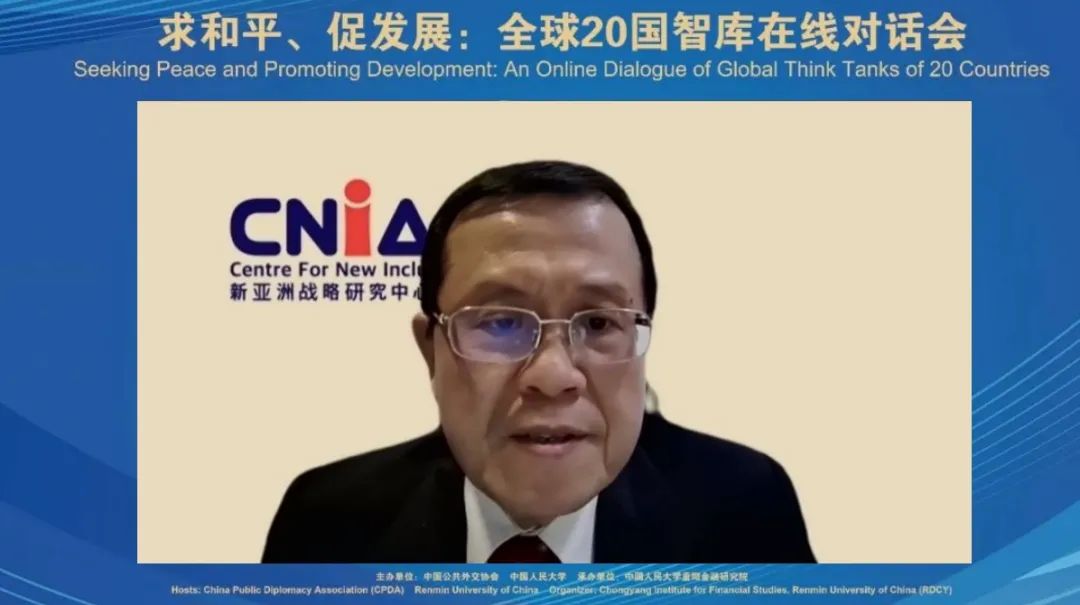
ONG Tee Keat, Former Deputy Speaker of House of Representatives of Parliament, Chairman of Centre for New Inclusive Asia of Malaysia, stressed that in recent years, with the resurrection of the Cold War spectre by the reigning hegemon, seeking regional or global peace has even been more challenging than ever before, as the world is now heavily compartmentalised, if not fragmented, along geopolitical rifts. Globalisation which has once presented the world with an era of multilateral cooperation that propelled economic development is now backpedaling with increasing incidences of unilateral sanctions and economic decoupling. Given such a gloomy security backdrop, President Xi's " Global Security Initiative " is no doubt a timely clarion call that provides the world with an alternative solution to the escalating geopolitical tension. It is part of the holistic strategy China offers to the international community in its bid as a responsible rising power to make the world a safer, a more inclusive and sustainable home for humankind.
Session 2 was moderated by Yang Qingqing, Deputy Dean of RDCY. During this session, the following panelists delivered the speeches:

Martin Jacques, Former Senior Fellow of Department of Politics and International Studies, Cambridge University, said that the US decline, the pandemic and climate change make up a formidable cocktail, which has brought the world into an era of great instability. Building a Community with a Shared Future for Mankind is not just a nice idea, it is the urgent, overarching imperative of our time. It will require patience, persistence, dialogue, compromise, the prioritisation of the long term over the short term. It will require new thinking and great imagination. That is the spirit and message of Belt and Road.
Fu Xiaoqiang, Vice President of China Institutes of Contemporary International Relations (CICIR), believes that the epidemic of the century is overlapping with the changes of the century, the international landscape is evolving at an accelerated pace, various security issues are emerging, and the theme of the times of peace and development has encountered serious challenges. In order to meet these challenges, we need to practice multilateralism and promote global cooperation and economic recovery, solve problems with a developmental perspective and approach, and find a common course for the world's great changes to move steadily and make progress.
Yury Tavrovsky, Head of the “Russian Dream and Chinese Dream” Research Center of the Izborsk Club, said that China's great breakthrough and Russia's stubborn resistance have put the American elite in front of the need to look for a new model of the world order instead of the unipolar one. America's division of the world into two opposing halves is just beginning. But it is already clear that globalization in its classical form, which originated after the end of the Second World War, goes down in history. The efforts of the weakening United States to divide the world into "democratic" and "authoritarian" halves accelerates the process of building an alternative system of global governance. Instead of global hegemony, Washington will get only "semi-globalization".
Zhang Weiwei, Director of the China Institute of Fudan University, stressed that the West’s threat to “apply all the hellish sanctions against Russia to China” is futile. Due to the economic interdependence between the United States and China, we do not want a war with the United States. But China has an insurmountable bottom line. We sincerely hope that the world will go forward in the direction of peace and development. At present, the main driving force to move towards an order of peace and development does not come from the West, but from the non-Western world.
Zamir Awan, Deputy Director of Center for China Studies, National University of Sciences and Technology, Pakistan. He proposed the establishment of “Asian Monetary Fund” (AMF), because the IMF has mostly left many developing countries in a difficult situation. But if it is the Asian Monetary Fund, it will be based on Asian roots to help those countries that are in need and in trouble. He believes that the AMF can enable Asia to wrestle with western society, so as to prevent the continued expansion of Western hegemony.
Chen Wenling, Chief Economist of China Center for International Economic Exchanges (CCIEE), stressed that now we are facing two big challenges: war and peace, development and security. At present, we should avoid the escalation of conflict, and prevent the occurrence of the Third World War. At this critical moment, think tank scholars from various countries should take a clear stand against war, and make preparations for the escalation of war.
Mohammed Saqib, Secretary General, India China Economic and Cultural Council (ICEC), stressed that the current chaos origins from the ongoing confrontation between the East and the West, which is putting pressure on the Middle East, Africa and Asia. Peace is a prerequisite for cooperation and development, and peace is not obtained by Western instructions; we have our own say, and it is achieved through mutual respect, dialogue, consultation, mutual input, and retaining mutual ownership.
Zhu Feng, Executive Dean of School of International Studies, Nanjing University. He said that today is the worst situation in global politics since the collapse of the Soviet Union. The UN-centered global governance system is going downhill, and the US is currently demonizing China to maintain the stability of the US hegemonic position. But no matter how turbulent the world political landscape is and how the competitive situation evolves, it is important to trust China, because China does not want to compete with the West for hegemonic status, but is working hard to contribute Chinese methods and keep exploring the process of democratization and modernization in China.
Li Yongquan, Director of Eurasian Institute, Development Research Center of the State Council, stressed that the 100-year change is ultimately a change in the course of world history triggered by the technological revolution and globalization. In the context of globalization, the law of the jungle has been abandoned by history. The concept of a Community with a Shared Future for Mankind is to comply with the historical trend and the concept of human development in all countries.
Fernando Reyes Matta, Former Ambassador to China and Director of the Center for Latin American Studies on China, Universidad Andres Bello, Chile. He believes that interdependence and independence are the key words of the 21st century. He hopes that Asian countries would also have the opportunity to establish mutually beneficial ties with Western societies, while integrating the philosophical governance ideas of Asian countries, so that the world can enter a new environment together, while retaining their respective autonomy and co-dependence.
Li Ziguo, Director and Research Fellow of the Department for European-Central Asian Studies, China Institute of International Studies (CIIS). He said that we are facing five major challenges: the recurrence of the pandemic, the low or non-binding nature of international rules, the decline in the credibility of international financial infrastructure, the overall "pan-politicization" and "pan-securitization" of sports, culture, education and science, and the continued expansion of NATO. He believes that the SCO, the BRICS, and China and the Arab states are the mechanisms that need to speak out against these challenges.
John Kirton, Co-Director of G20 Research Group and BRICS Research Group at University of Toronto, believes the performance of the G20 countries. In many key areas, China has been a leader, complying with them well above the norm and thus bearing more than its fair share of the burden of making G20 global governance work. The world now looks to China, to lead the G20 and the world, out of this deadlock, so all can come together to control the existential threat of climate change.
Huang Renwei, Executive Vice Dean of Fudan Institute of Belt and Road & Global Governance, shared his understanding of war and peace. He said that in the past, China's concept of peace was no world war in the world. But the current situation has changed. From the Russia-Ukraine conflict, we can see that although the world war did not break out, the global impact caused by the local war has emerged. Therefore, peace cannot be judged by whether a world war breaks.
Peter Koenig, Former Senior Economist of the World Bank, stressed that his interpretation of “globalization” - Chinese style – is connecting people through trade, joint projects, exchange of ideas, of cultural events and education – as in learning from each other. It is “globalization”, by connecting in Peace – striving for new ideas to socioeconomic development, creating dynamics, where nations’ sovereignty remains an essential element. Thereby clearly promoting the building of a Community with a Shared Future for Mankind, in an effort to open up a bright and beautiful future for the world.
Mostafa Mohammadi, Adjunct Professor and Researcher of Strategic Management in Shahid Beheshti University of Iran, said that "Development" is neither enough nor balanced in the world today. "Balanced Development" is crucial for peace, while unbalanced development is a critical obstacle to peace. Development also has various meanings to different people and from time to time. We must rethink globalization and its significance to mankind.
Ligia Maura Costa, Professor at Escola de Administração de Empresas de São Paulo - Fundação Getulio Vargas (FGV-EAESP) praised the “Global Security Initiative” put forward by the President Xi Jinping. But there is a long way to go to implement the proposed GSI. As soon the world moves forward to a new global agenda of development, security and peace, the humanity may meet its current needs without compromising the need of the future generations.
Finally, Hu Zhengyue, Vice President of China Public Diplomacy Association, made a concluding speech. He summarized three key points of maintaining world peace and development by combining the views of all panelists: First, we should adhere to multilateralism and oppose power politics; Second, we should adhere to common security and oppose absolute security; Third, we should resolve regional crises and prevent world crises. He stressed that the current international political and economic security order is facing many challenges. We expect everyone to turn their wisdom of ideas gathered today into a strong capacity for action, and play an active role for their respective countries. We should jointly make our contributions to the lasting peace and development of the world, and the universal security of the world.
Tamas Hajba, Senior Advisor for China, Head of the Beijing Office, Organisation for Economic Cooperation and Development (OECD); Rita Pawestri, Setyanignsih, Research Fellow, Research Center for Area Studies, National Research and Innovation Agency (BRIN), Indonesia; Natee Taweesrifuengfung, President of Siam Intelligence Unit, Thailand; Rosario Santa Gadea, Director of Center for China and Asia-Pacific Studies of Universidad del Pacífico, Peru; Marc Uzan, Executive Director, Reinventing Bretton Woods Committee, France; Hisham El-Zimaity, Secretary General of the Egyptian Council for Foreign Affairs, Egypt; Jaya Josie, Visiting Professor, Zhejiang University International Business School (ZIBS), South Africa, joined in this dialogue as observers.
Key Words: China MFA Le Yucheng RDCY























































































 京公网安备 11010802037854号
京公网安备 11010802037854号





